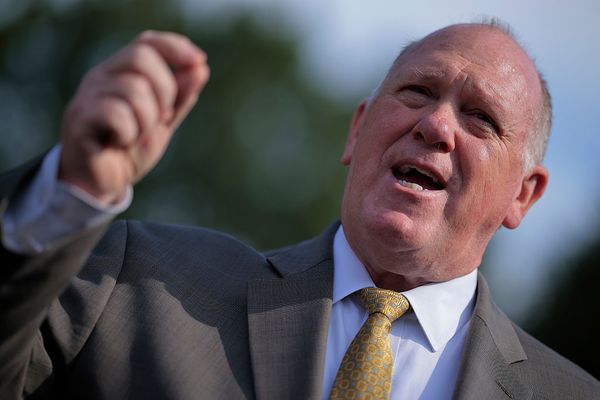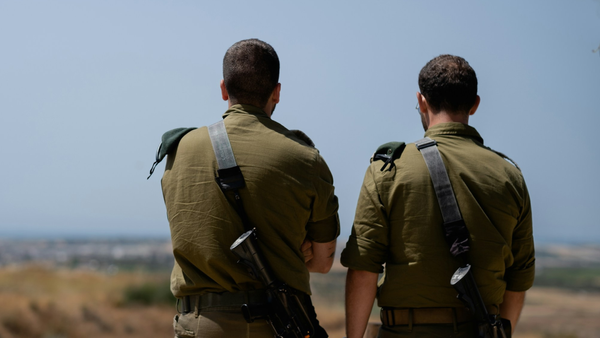
Fleeing the battle for Kherson
Daniel Boffey travelled to Kherson, where Russia’s grip appeared increasingly fragile after a weekend in which all civilians were ordered to leave immediately in the face of the advancing Ukrainian counteroffensive.
Kherson city was taken in the very early days of the war and remains the only regional capital to fall to Russia since 24 February. The residents of Kherson and the region have suffered enormous losses: in March, Russian soldiers swept into the farming village of Dudchany, setting up bases in abandoned homes and municipal buildings. There was constant heavy shelling, and the sound of low-flying planes would fill villagers, hiding in bunkers, with fear. The story of Dudchany is that of the brutal reality of a community that has found itself with a war on its doorstep, Boffey writes.
“As she was driven by her son out of Dudchany … Rosaliya Kovalchuk, 72, glimpsed something from the backseat that will haunt her forever.”
“‘Hanging from the branches of a tree were guts from a man’s belly,’ Kovalchuk said, pausing as she sought to collect her emotions. ‘A military car had been blown up. I think he was Russian from the boots and the uniform.’”

Russian strikes take toll on Kyiv’s electricity
Ukrainians living in and around Kyiv have been told of a “sharp deterioration” in the region’s electricity supply after a fresh wave of Russian strikes aimed at sapping public morale as the country’s cold winter approaches, Dan Sabbagh reported.
A local energy supplier, Yasno, warned that existing blackouts could last a lot longer than a previously planned schedule of four-hour outages and that the capital already faced an electricity deficit of about 30% or more.
Oleksiy Kuleba, the governor of the Kyiv region, said the area, including the capital city, was a victim of Russian attacks on Ukraine’s national grid. “A number of critical facilities have been disabled,” he added.
Russia has brought Ukraine’s electricity system to crisis point in little over a fortnight, by switching the focus of its missile and drone attacks to power stations and the distribution grid.

Putin’s ‘hidden hybrid war’ in Europe
The Guardian’s foreign affairs commentator, Simon Tisdall, wrote about the Storskog border crossing in Finnmark, where Arctic Norway comes face to face with the cold reality of Russia.
“Reasons to worry afresh about the border are multiplying following Vladimir Putin’s invasion of Ukraine. Norwegian police recently arrested several Russians, equipped with drones and cameras, who were showing unusual interest in oil and gas installations. Some of the suspected spies entered via Storskog.
“Since Russia cut energy supplies to Europe in retaliation for western sanctions – and following last month’s sabotage of the Nord Stream Baltic pipelines – Norway has become Europe’s biggest gas supplier. And while the Oslo government is not directly accusing Moscow, it knows that makes it a prime target for covert hybrid warfare operations.”
Russian propaganda turns to ‘dirty bombs’
After Russia accused Ukraine of planning to use a dirty bomb on its own soil and then blame it on Russia, a claim it took to the UN security council, Peter Beaumont and Andrew Roth explained just what a dirty bomb is, and what Russia is up to: in the first instance, Putin’s aim appears to be to get the west talking about how a dirty bomb could be used and what that would mean, much in the same way that Moscow’s hints about using a tactical nuclear weapon in Ukraine dominated the news agenda, they explain.
Later in the week, Putin said that the claims were made on his direct orders. In a speech near Moscow, Putin claimed once again that Russia knew “about an incident with a so-called ‘dirty bomb’ being prepared”, and that Russia knew “where, generally, it was being prepared”.
Once again he gave no evidence of the alleged plot, which included the possibility of the device being loaded on to a Tochka-U or other tactical missile, detonated and then “blamed on Russia”.
Kyiv has strongly denied the accusations and said that Russia is using nuclear blackmail in order to try to block support for its successful counteroffensive against the Russian invasion force.
PoW’s journey to freedom
After Volodymyr Zelenskiy last week announced a prisoner swap between 108 Ukrainian women and 110 Russians – the first all female prisoner swap of the war – Daniel Boffey tracked Alina Panina who was one of those freed in the exchange.
After five months in the most notorious jail in occupied Ukraine, she found herself, without explanation, at the foot of a bridge over a river in no man’s land with 107 fellow female Ukrainian prisoners of war. “We were told nothing,” she said. But then the order came to cross.
Panina, a junior sergeant in the national border guard, described the experience of counting off the hours and endless days with 28 other women in a cell designed for four.Nights could be difficult.
“Because of where we had been people would wake up screaming. It was difficult to sleep because the slightest noise would alarm people. But we became like sisters. We would spend our time talking about recipes, braiding each other’s hair. I read. The Russians gave us some books all about their history.”

Russian war crimes ‘going unpunished’
Dan Sabbagh interviewed Oleksandra Matviichuk, the Ukrainian lawyer who heads the Centre for Civil Liberties which this month jointly won the Nobel Peace Prize. The body she heads has patiently documented more than 21,000 examples of war crimes committed by occupying Russian forces since 2014, including many from after the invasion in February.
“I haven’t any legal instrument to stop the Russian atrocities.” She told Sabbagh she has no immediate way of bringing perpetrators to court.
“After the large-scale invasion, we every day documented different kinds of war crimes, like intentional shelling of residential buildings, churches, hospitals, schools, the shelling of evacuation corridors,” Matviichuk said. “We received requests for help from people in the occupied territories because they were abducted, tortured; we recorded sexual violence, extrajudicial killings.”
Staff from the Centre for Civil Liberties were among those who travelled through Irpin, Bucha and towns and villages north-west of Kyiv after Russia abandoned its attempt to seize the city in March. “I will remind you,” she says, that bodies were found lying uncollected in the streets, or dumped in mass graves. “And what was Putin’s response? He provided medals to the army unit that was staying in Bucha.”

The view from Bosnia
Bosnian Poet Faruk Šehić wrote in an opinion piece that if you “stop a person on the street in Sarajevo and ask them what they think about the war in Ukraine, they’ll tell you they think that almost everything that happened in the war in Bosnia-Herzegovina is happening in Ukraine.
“In April, we commemorated the 30th anniversary of the war against Bosnia-Herzegovina. We consider early April 1992 the moment a new era began: we have the before, during and after the catastrophe.
“A month into the war in Ukraine I saw Ukrainians starting to use the phrase “before the war”. We went through everything that’s happening to them, but no one asks us about it or wants us to help.”








